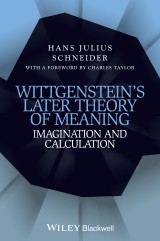Details

Wittgenstein's Later Theory of Meaning
Imagination and Calculation1. Aufl.
|
56,99 € |
|
| Verlag: | Wiley-Blackwell |
| Format: | |
| Veröffentl.: | 14.01.2014 |
| ISBN/EAN: | 9781118642146 |
| Sprache: | englisch |
| Anzahl Seiten: | 200 |
DRM-geschütztes eBook, Sie benötigen z.B. Adobe Digital Editions und eine Adobe ID zum Lesen.
Beschreibungen
By exploring the significance of Wittgenstein’s later texts relating to the philosophy of language, <i>Wittgenstein’s Later Theory of Meaning</i> offers insights that will transform our understanding of the influential 20th-century philosopher.<br /> <br /> <ul> <li>Explores the significance of Wittgenstein’s later texts relating to the philosophy of language, and offers new insights that transform our understanding of the influential 20th-century philosopher</li> <li>Provides original interpretations of the <i>systematic</i> points about language in Wittgenstein’s later writings that reveal his theory of meaning</li> <li>Engages in close readings of a variety of Wittgenstein’s later texts to explore what the philosopher really had to say about ‘kinds of words’ and ‘parts of speech’</li> <li>Frees Wittgenstein from his reputation as an unsystematic thinker with nothing to offer but ‘therapy’ for individual cases of philosophical confusion</li> </ul>
<p>Acknowledgments vii</p> <p>Foreword by Charles Taylor viii</p> <p>Introduction 1</p> <p>1 The Fregean Perspective and Concomitant Expectations One Brings to Wittgenstein 7</p> <p>2 How a Language Game Becomes Extended 21</p> <p>3 Kinds of Expression 35</p> <p>4 “Function” in Language Games and in Sentential Contexts 47</p> <p>5 The Sound of a Sentence I: Singing from the Score 67</p> <p>6 Projection: No Mere Mapping but a Creative Activity 83</p> <p>7 The Sound of a Sentence II: Surface Grammar 98</p> <p>8 Complexity 104</p> <p>9 An Integration of Wittgenstein and Frege? 115</p> <p>10 Dummett’s Doubts and Frege’s Concept of “Sense” 128</p> <p>11 Wittgenstein on “Communicating Something” 137</p> <p>12 “Grammatical Sense” and “Syntactic Metaphor”: A Wittgensteinian Solution 152</p> <p>13 A “Theory of Meaning” – In What Sense? 166</p> <p>Index 180</p>
<p><b>Hans Julius Schneider</b> is Professor Emeritus of Philosophy at the University of Potsdam. His publications include <i>Phantasie und Kalkül</i> (1992) and <i>Religion</i> (2008). He also served as a co-editor of the journal <i>Deutsche Zeitschrift für Philosophie</i> for a number of years and has made several contributions to this publication as well as numerous other philosophical essay collections.</p>
<p><i>Wittgenstein’s Later Theory of Meaning: Imagination and Calculation</i> presents a comprehensive analysis and exploration of the significance of Wittgenstein’s later philosophy of language for a theory of meaning. Proposing that there is a network of systematically connected insights to be found in Wittgenstein’s later writings that is of epistemological relevance, renowned philosopher and Wittgenstein scholar Hans Julius Schneider attempts to free Wittgenstein from his reputation as an unsystematic thinker with nothing to offer but “therapy” for individual cases of philosophical confusion.</p> <p>Schneider argues his points by first summarizing Gottlob Frege’s philosophy of language, then engaging in close readings of a variety of Wittgenstein’s texts to explore what he really has to say about “kinds of words” and “parts of speech.” Subsequent chapters explore and answer questions centered on the concepts of “imagination” and “projection”; discuss Wittgenstein’s struggle with his older models of linguistic complexity; and spell out the consequences for the project of a “theory of meaning.” Innovative and original, <i>Wittgenstein’s Later Theory of Meaning</i> represents an important and invaluable contribution to Wittgenstein scholarship that offers rich new insights into one of the 20th century’s most influential philosophers.</p>
<p>"Schneider's penetrating and original reading transformed my understanding of the later Wittgenstein."</p> <p>—Robert B. Brandom, University of Pittsburgh</p> <p>“Schneider’s originality shows itself in his forceful way of pointing out that certain insights articulated by Wittgenstein can be used to clarify those aspects of the Frege-Dummett project of constructing a systematic theory of meaning that may continue to inspire imaginative new work in the philosophy of language.”</p> <p>—Joachim Schulte, University of Zurich</p>

















